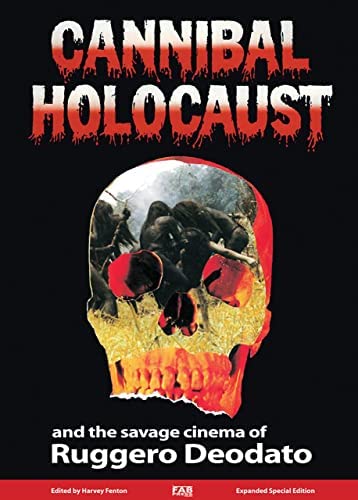 By HARVEY FENTON, JULIAN GRAINGER, GIAN LUCA CASTOLDI (FAB Press; 1999/2022)
By HARVEY FENTON, JULIAN GRAINGER, GIAN LUCA CASTOLDI (FAB Press; 1999/2022)
This volume, compiled by FAB Press founder Harvey Fenton, is (as of early 2023) the only English language book dedicated solely to the late Italian filmmaker Ruggero Deodato. At just 111 pages (144 in the revised edition) it’s not especially wide-ranging or in-depth, although in truth there’s really not much in-depth information to be had on Deodato, a talented craftsman rather than an auteur.
Ruggero Deodato is destined to be forever known for just the film whose name adorns this book’s title. That 1980 release remains one of the most savage and uncompromising of all time, and permanently bestowed the title “The Man Who Made CANNIBAL HOLOCAUST” on Deodato.
Yet among Italian cinema aficionados Deodato was known for his versatility, having turned out comedies, actioners, erotic thrillers, splatter flicks, romantic dramas and TV miniseries. All are covered in these pages, which also contain a career-spanning interview with the man himself. The book may not satisfy as an in-depth profile, but as a reference guide it works fine.
The filming and censorship-plagued reception of CANNIBAL HOLOCAUST are covered fairly voluminously, as you might expect. Deodato’s other films, which include the gender swapped TARZAN pastiche GUNGALA, THE BLACK PANTHER GIRL/Gungala la pantera nuda (1968), the erotic thriller WAVES OF LUST/Ondata di piacere (1975), the disaster thriller CONCORDE AFFAIRE 79 (1979; not to be confused with the same year’s CONCORDE: AIRPORT 79) and the home invasion splatter fest HOUSE ON THE EDGE OF THE PARK/La casa sperduta nel parco (1980), get write-ups that are less in-depth but still reasonably comprehensive, a heroic act on the parts of Fenton and his co-writers, as the vast majority of those films are frankly pretty worthless.
Of the Deodato interview that comprises much of the rest of the book, it’s not bad. Deodato speaks affectionately yet with great bluntness of his early apprenticeship under the late Roberto Rossellini, and his work as an assistant director for big name directors like Riccardo Freda, Antonio Margheriti and Sergio Cobucci. Of the latter’s spaghetti western classic DJANGO (1966), Deodato alleges he directed portions of it and helped cast Franco Nero in the title role, although in more recent years Nero apparently “pretend(ed) not to know” Deodato.
Deodato also accuses Oliver Stone of copying CANNIBAL HOLOCAUST in NATURAL BORN KILLERS, claims to have received death threats from a CANNIBAL HOLOCAUST jungle guide, and says of the 1984 actioner CUT AND RUN/Inferno in diretta that “there were too many stars, one didn’t want to do one thing, one was always drunk, and I (who neither drink nor smoke) had to battle against everybody.” Puzzlingly, he has good only things to say about the ludicrous giallo pastiche DIAL: HELP/Minaccia d’amore (1988), which he calls a “delicious film.”
For most horror fans this book’s highlight, I imagine, will be its extensive reproductions of Deodato related stills, lobby cards, posters and VHS covers. Many of these images are quite rare, having been taken from Deodato’s personal collection, and given eye-popping (and unflinching, being presented in their full adults-only glory) form.
